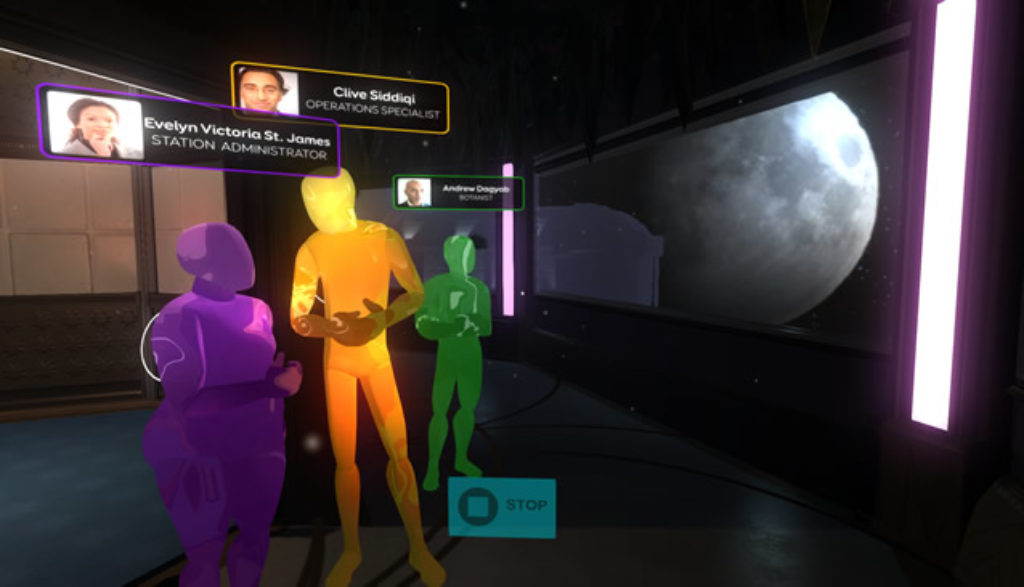
Ever wish you could choose to follow someone other than the protagonist in a movie you’re watching?
I mean, what if you could tag along with that quirky secondary character with the multicolored hair and the crazy sense of humor and see what she’s up to when she ambles out of the central storyline? Well, that’s essentially what the walking simulator game Tacoma lets you do. In fact, it pretty much demands that you do so.
And that makes for an interesting—if at times surprisingly problematic—gaming experience.
Gamers play as a communications specialist/investigative subcontractor named Amy Ferrier in a richly detailed deep-space world. Amy’s job is simple: board the abandoned Lunar Transfer Station Tacoma, download some key bits of stored data, and retrieve the station’s extremely valuable AI module.
Of course, things aren’t going to be as cut and dried as all that. For you see, there are clues that something strange and unexpected happened aboard this isolated station. It’s a curious mystery, one that apparently threatened the lives of the outpost’s six-person crew.
And even in the dead quiet of an abandoned space station, curiosity can get the best of you.
It’s the year 2088, we learn, a time when big corporate entities own space stations like this one. As such, those entities also keep close tabs on employees who are so far away from the home office. To that end, the entire Tacoma station and its crew are surveilled at all times: when they get up, when they eat, when they exercise, when they work, when they shower. The station’s AI is always watching, always present, always recording.
That plot device brings us back to the follow-whoever-you-want idea I mentioned above. As you poke around in the various work zones and common areas of the station, you soon discover that you can download, play back and walk along with recordings of the crew—represented by blocky, life-size, ghost-like 3-D constructs.
Generally the crewmembers are present somewhere in each of these recreated scenes. But they’re not always together. So you can stop and rewind the playback at any point, follow one character as she walks off mumbling to herself, or seek out the others alone or in pairs as they interact publically and privately. If an observed conversation leaves more questions than answers, a note discovered later on a desktop or a secreted-away email may suddenly make the pieces of the mystery click together.
Complicating things further, much of the station’s stored augmented reality data recordings are corrupted. Thus, the scenes you walk through are often seemingly snatched at random from different timelines. But piece-by-piece and scene-by-scene, it becomes increasingly clear that it’s not just the station’s data that’s been corrupted. In addition, the politics and power players at the heart of this mystery reveal a deeper, more unnerving human corruption as well.
As you sync together this mystery’s clues and details, you also get to know the various crewmembers quite personally. They express their loves and fears, their interests and hopes. That can be positive in that you come to care for these characters and strongly hope to see them eventually make it through the dangerous trials they face.
But that familiarity also makes you privy to some parts of their relationships that you might not necessarily need or want to know about. Raw language, including a couple of f-words, gets mixed into these conversations. And as you follow both an opposite-sex and same-sex couple in the crew, you eavesdrop on their romantic moments.
There’s never anything sexually explicit in these interactions, and the relationships aren’t the focal point of the storyline. That said, the storyline’s inclusion of them is significant nonetheless.
Tacoma, then, offers a deeply engaging deep-space mystery. But it’s complicated by relational elements that propel the narrative into some unexpectedly intimate spaces as well.

After spending more than two decades touring, directing, writing and producing for Christian theater and radio (most recently for Adventures in Odyssey, which he still contributes to), Bob joined the Plugged In staff to help us focus more heavily on video games. He is also one of our primary movie reviewers.